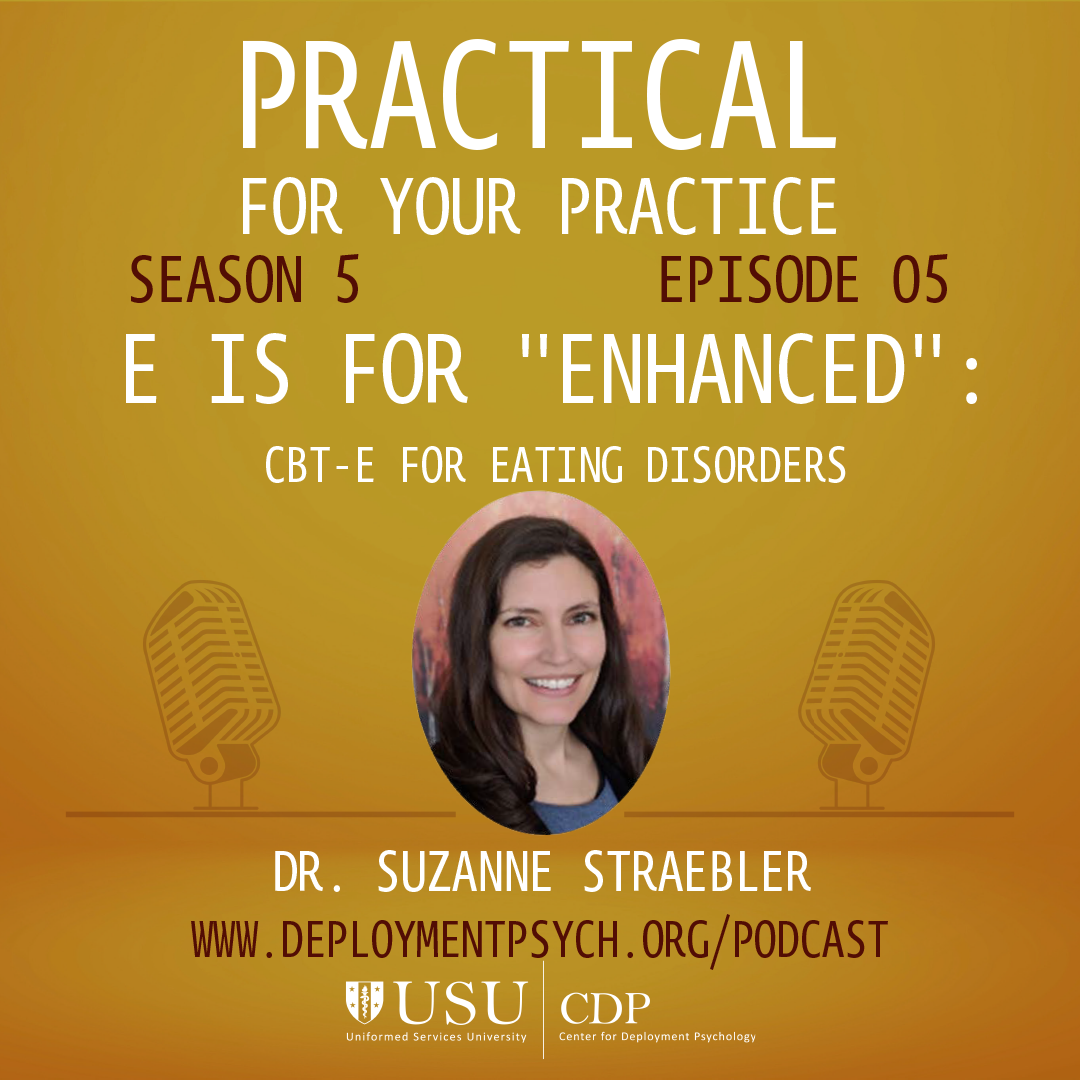 Episode 5, Season 5: E is for "Enhanced": CBT-E for Eating Disorders
Episode 5, Season 5: E is for "Enhanced": CBT-E for Eating Disorders
Guest: Dr. Suzanne Straebler
Eating disorders often have a “bad rap” as being intractable, difficult to treat, and dangerous. There is a wide range of eating disorders, each with their own unique features and challenges. And to make matters more complicated, many mental health providers do not receive focused training on how to treat these disorders, oftentimes leading to reticence to engage, worried that we’ll say or do the wrong thing.
Fortunately, there is an effective evidence-based psychotherapy for eating disorders–CBT-E (The E is for “Enhanced”). While CBT-E shares a lot with other standard CBT therapies, there are some differences and enhancements that address the unique psychological challenges clients with eating disorders face. Join us with Dr. Suzanne Straebler, psychologist and expert in treating eating disorders, as she discusses CBT-E, its general components, and how you can receive focused training to treat these disorders.
 |
 |
 |
Show Notes:
Suzanne Straebler, PhD, PMH-BC, is the clinical director of the Center for Eating Disorders Partial Hospital Program and Outpatient Specialty Clinic at Weill Cornell Medicine – New York Presbyterian Hospital. She holds an academic appointment at Weill Cornell Medicine as a research associate in psychiatry. She is a lead trainer for the CBT-E training group and has trained and supervised therapists around the world. For over a decade Suzanne was a Senior Research Clinician at the Centre for Research on Eating Disorders at Oxford (CREDO) headed by Professors Christopher Fairburn and Zafra Cooper. While there, she received extensive clinical training, was a contributing author of the CBT-E treatment manual, assisted in the creation of a web-based CBT-E training program, and completed her doctoral thesis on improving therapist training in evidence-based treatments.
Calls-to-action:
- Screen patients for eating disorders – A brief 5-question screener can be found at – https://eatingdisorderscreener.org/ (*This screener may miss individuals with Binge Eating Disorder. Don’t avoid asking questions about one’s view of their shape and weight and comfort with their current eating habits).
- Check your own weight bias and stigma and consider how it may impact your views on who can have an eating disorder and its impact on treatment of individuals of all body shapes and sizes– some information can be found here - https://nedc.com.au/eating-disorders/eating-disorders-explained/weight-stigma
- Eating disorders are treatable with well implemented evidence-based treatments – find out more about one of these treatments, CBT-E, here – https://www.cbte.co/
- Consider registering for and attending an upcoming CBT-E workshop at CDP. You can find upcoming training opportunities here – https://deploymentpsych.org/training .
- Like what you’re hearing? Like this episode, subscribe to the podcast, and share with others! Do you have questions for our hosts? Feedback from prior episodes? Want to share your own “What Is Your Why?” story? Join us on Aug 13, 2024 from 1000-1200 EDT for our first-ever “Live” episode of Practical For Your Practice. Call us at 301-715-8592, code: 4878058925# to talk to our hosts live. Or if you can’t make it at that time, leave us a voicemail message at https://speakpipe.com/cdpp4p or an email at cdp-podcast-ggg@usuhs.edu. While the episode will not be broadcast/streamed live, we will record, edit, and include the discussion in our final episode of the season. Come join the conversation!
- Subscribe to the Practical for Your Practice Podcast
- Subscribe to the Center for Deployment Psychology's Monthly Email
This podcast is produced by the Center for Deployment Psychology at the Uniformed Services University of the Health Sciences. The views expressed are those of the speakers and do not necessarily reflect the opinions of the Uniformed Services University, the Department of Defense, or the US Government. In addition, reference to any specific company, products, processes, or services does not necessarily constitute or imply endorsement by the Uniformed Services University, the Department of Defense, or the US Government.
